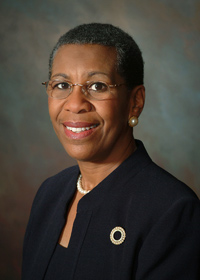
(KALAMAZOO, Mich.) July 14, 2014 – After a national search, Kalamazoo College has named Mia Henry as executive director of its Arcus Center for Social Justice Leadership. She will begin her duties in Kalamazoo on August 11.
Since 1998, Henry has worked as a nonprofit administrator, education program developer, public school and university instructor, and social justice leader at the local and national level.
She will join the Arcus Center—established by Kalamazoo College in 2009 with generous support from the Arcus Foundation—just as it plans to move into its much anticipated new building on the K campus, and just weeks before its With/Out Borders Conference, scheduled for Sept. 25-28.
Henry replaces Jaime Grant who announced her intention to leave the Center last year.
“We are thrilled to welcome Mia Henry to Kalamazoo College,” said K President Eileen Wilson-Oyelaran. “She is a strategic, thoughtful leader with wide experience in social justice, education, and leadership development. She’s served as an executive, educator, entrepreneur, and supervisor. I’m convinced she will help us build on the multifaceted collaborative efforts that have helped shape K’s social justice leadership center into the first of its kind in higher education.”
“Mia will build upon the excellent work of ACSJL inaugural director Jaime Grant who led the Center for four years and helped launch the Kalamazoo College Global Prize for Collaborative Social Justice Leadership, among many other stellar programs,” said Wilson-Oyelaran.
Henry said what excites her most about the prospect of leading the Center is that “I will have the chance to share my passion for social justice advocacy with K students, faculty, and staff, as well as with people in the Greater Kalamazoo community and across the country who are at the forefront of campaigns addressing today’s most pressing issues.
“Kalamazoo College’s commitment to connecting academia to the study and practice of social justice aligns with my own professional mission and personal values. I look forward to helping the Arcus Center continue to embrace practices that support collaboration, transparency, and bold programming.”
Her duties at K—in collaboration with Arcus Center Academic Director Lisa Brock—will include maintaining and augmenting the vision for the Center; developing programming and partnerships with local, national, and international organizations; raising the profile of the Center and the College nationally and internationally; and working with K faculty, staff, and students on innovative projects and practices in social justice leadership.
For the past four years, Henry has served on the national leadership team for Black Space, an initiative of Safe Places for the Advancement of Community and Equity (SPACEs) that supports intergenerational groups of community leaders working for racial equity across the United States.
She currently serves on the boards of directors for the Community Justice for Youth Institute and the Worker’s Center for Racial Justice, both in Chicago, and has been a consultant with the Chicago History Museum, Chicago Public Schools, the University of Chicago Hospital, and the University of Chicago Oriental Institute.
She founded Reclaiming South Shore for All, a diverse grassroots group of residents committed to mobilizing Chicago’s South Shore community by institutionalizing systems that promote peace, youth leadership, and political accountability. She also owns and operates Freedom Lifted, a small business dedicated to providing civil rights tours for people of all ages.
From 2007 to 2012, Henry served as the founding director of the Chicago Freedom School, overseeing most aspects of the nonprofit school dedicated to developing students aged 14 to 21 to be leaders in their schools and communities and to training adults to support youth-led social change.
She previously served as associate director of Mikva Challenge, a Chicago-based nonprofit that engages high school students in the political process, working with more than 50 Chicago-area high schools to design and implement curricula for teaching “Action Civics” and addressing racial segregation.
Henry was a senior program consultant in youth development at the University of Chicago, a visiting lecturer at the University of Illinois at Chicago where she taught courses to students pursuing a master’s degree in youth development, and a program coordinator for City University of New York where she monitored college performance in the areas of enrollment and student achievement and developed centralized parent outreach initiates.
From 1998 to 2003, Henry was a social studies teacher and International Baccalaureate Middle-Years program coordinator at Roald Amundsen High School in Chicago.
An Alabama native, Henry earned a B.S. degree in sociology/criminal justice from Rutgers University in New Brunswick, N.J., and a M.S. Ed. degree in secondary education from the University of Pennsylvania in Philadelphia.
The mission of the Arcus Center for Social Justice Leadership is to support the pursuit of human rights and social justice by developing emerging leaders and sustaining existing leaders in the field of human rights and social justice, creating a pivotal role for liberal arts education in engendering a more just world.
Kalamazoo College (www.kzoo.edu), founded in Kalamazoo, Mich., in 1833, is a nationally recognized liberal arts and sciences college and the creator of the K-Plan that emphasizes rigorous scholarship, experiential learning, leadership development, and international and intercultural engagement. Kalamazoo College does more in four years so students can do more in a lifetime.










